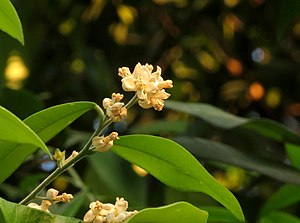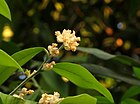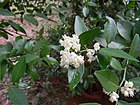Note: This is a project under development. The articles on this wiki are just being initiated and broadly incomplete. You can Help creating new pages.
Difference between revisions of "Atalantia monophylla"
| Line 13: | Line 13: | ||
==Common names== | ==Common names== | ||
| − | {{Common names|sa=|en=|gu=|hi=|kn=|ks=|ml=|mr=|pa=|ta=|te=}} | + | {{Common names|sa=Atavijambira|en=Indian Atalantia, Nilgiri Atalantia|gu=|hi=|kn=Adavi limbe, Adavi nimbe|ks=|ml=Katnaranjee, Kattukurunnu|mr=Maakadlimbu, Makadlimbu|pa=|ta=Anakamitam, Iyachakurinji|te=Adavi nimma, Adavimunugudu}}<ref name="Common names"/> |
==Properties== | ==Properties== | ||
| Line 71: | Line 71: | ||
<ref name="Leaf">[Morphology]</ref> | <ref name="Leaf">[Morphology]</ref> | ||
<ref name="How to plant/cultivate">[http://tropical.theferns.info/viewtropical.php?id=Atalantia+monophylla Cultivation]</ref> | <ref name="How to plant/cultivate">[http://tropical.theferns.info/viewtropical.php?id=Atalantia+monophylla Cultivation]</ref> | ||
| + | |||
| + | <ref name="Common names">[https://www.flowersofindia.net/catalog/slides/Indian%20Atalantia.html Common names]</ref> | ||
| + | |||
</references> | </references> | ||
Latest revision as of 16:13, 14 September 2020
Indian atalantia is a small, much-branched, evergreen tree. It grows up to 6 metres tall. The branches are usually armed with single, sharp spines up to 2cm long. The plant is harvested from the wild, usually for medicinal purposes.
Contents
- 1 Uses
- 2 Parts Used
- 3 Chemical Composition
- 4 Common names
- 5 Properties
- 6 Habit
- 7 Identification
- 8 List of Ayurvedic medicine in which the herb is used
- 9 Where to get the saplings
- 10 Mode of Propagation
- 11 How to plant/cultivate
- 12 Commonly seen growing in areas
- 13 Photo Gallery
- 14 References
- 15 External Links
Uses
Parts Used
Chemical Composition
Chemical composition of isolated essential oil was analyzed by gas chromatography, gas chromatography coupled with mass spectrometry.[1]
Common names
| Language | Common name |
|---|---|
| Kannada | Adavi limbe, Adavi nimbe |
| Hindi | |
| Malayalam | Katnaranjee, Kattukurunnu |
| Tamil | Anakamitam, Iyachakurinji |
| Telugu | Adavi nimma, Adavimunugudu |
| Marathi | Maakadlimbu, Makadlimbu |
| Gujarathi | |
| Punjabi | |
| Kashmiri | |
| Sanskrit | Atavijambira |
| English | Indian Atalantia, Nilgiri Atalantia |
Properties
Reference: Dravya - Substance, Rasa - Taste, Guna - Qualities, Veerya - Potency, Vipaka - Post-digesion effect, Karma - Pharmacological activity, Prabhava - Therepeutics.
Dravya
Rasa
Guna
Veerya
Vipaka
Karma
Prabhava
Habit
Identification
Leaf
| Kind | Shape | Feature |
|---|---|---|
Flower
| Type | Size | Color and composition | Stamen | More information |
|---|---|---|---|---|
| {{{5}}} |
Fruit
| Type | Size | Mass | Appearance | Seeds | More information |
|---|---|---|---|---|---|
Other features
List of Ayurvedic medicine in which the herb is used
Where to get the saplings
Mode of Propagation
How to plant/cultivate
Plants succeed in warm subtropical to tropical climates.[4]
Commonly seen growing in areas
Open country near the sea, Himalayas.
Photo Gallery
References
- ↑ Chemical constituents
- ↑ Common names
- ↑ [Morphology]
- ↑ Cultivation
External Links
- Ayurvedic Herbs known to be helpful to treat Chronic rheumatism
- Herbs with Fruits used in medicine
- Herbs with common name in Kannada
- Herbs with common name in Malayalam
- Herbs with common name in Tamil
- Herbs with common name in Telugu
- Herbs with common name in Marathi
- Herbs with common name in Sanskrit
- Herbs with common name in English
- Habit - Evergreen tree
- Index of Plants which can be propagated by Seeds
- Herbs that are commonly seen in the region of Open country near the sea
- Herbs that are commonly seen in the region of Himalayas
- Herbs
- Pages without herbs images




